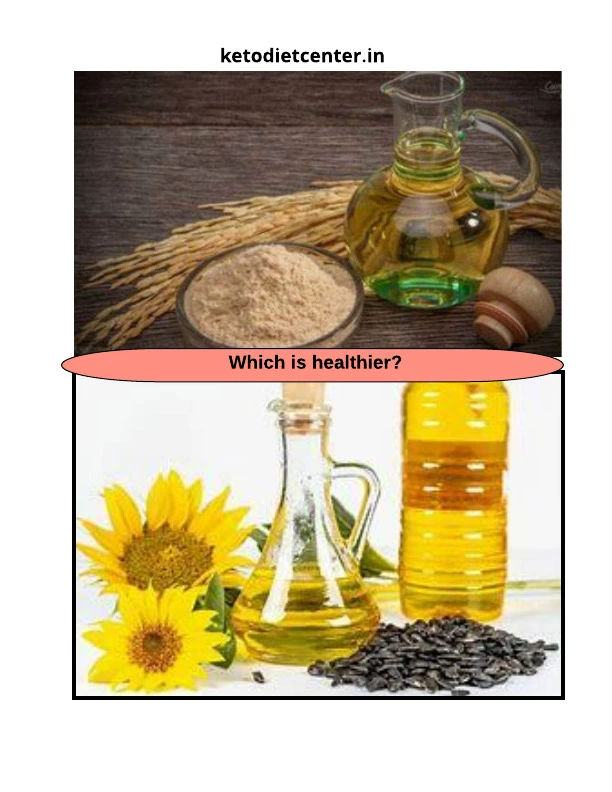Know complete information related to Rice bran oil vs Sunflower oil in very easy and simple language through this post of ours.
Today, the abundance of plant-based cooking oils in the market often makes it difficult to determine which one to use while preparing food. Two of these oils, rice bran oil and sunflower oil, have the same nutrient profile at 120 calories and about 13 grams of fat per teaspoon. Both oils deserve a place in a healthy diet, but they vary in their nutritional value.
Here in this article, we summarise the points of difference between rice bran and sunflower oil. These might help you to decide what better suits you.
What is Sunflower oil?
As the name suggests, sunflower oil is extracted from sunflower seeds. The seeds are first cleaned to remove any dust and dirt and then ground into a coarse powder. Coarse powder is added to the ground and pressed to release essential oils. The oils released are refined further to make packaged oils that we get in the markets.
What is Rice bran oil?
Rice bran oil is extracted from a rice grain husk. Special machines are used to squeeze the oils completely. The extracted oil is stored separately in the machine to prevent mixing with other remaining rice husks. Hexane, the most commonly used solvent, is used to refine rice bran oil into the quality you get in the shops for purchase.
Here are the key points of debate on Rice bran oil vs Sunflower oil.
Rice bran oil vs Sunflower oil
Rice bran oil and sunflower oil are beneficial for health. You may be wondering how rice bran oil compares sunflower oil for good fats, antioxidants, cholesterol-lowering effects and other health benefits. Given their nutritional value, they look great and people are using both.
Appearance
Sunflower oil – Sunflower oil has a distinct golden, light colour. It is one of the most commonly used oils for cooking. It is flavourless and can be used to cook a variety of dishes.
Rice bran oil – Rice bran oil is dark gold. It is widely used in Asian countries where rice is mainly cultivated. This oil has a mild smell of rice, but it is otherwise flavourless.
Fatty acid composition
Sunflower and Rice bran oil are low in saturated and rich in unsaturated fatty acids that make them ideal for people with heart disease and high blood cholesterol levels.
Vitamin E
Both oils contain vitamin E. Sunflower oil is higher in vitamin E than rice bran oil – 5.6 mg per teaspoon or 37 per cent of suggested daily intake. To compare, a teaspoon of rice bran oil contains 29 per cent of the recommended daily value of vitamin E.
Omegas
You may have heard of omega-3 and omega-6 fatty acids, the main essential fatty acids in the human diet. While both oils contain high amounts of omega-6 fatty acids, neither of them contain many omega-3 fatty acids. While it doesn’t cross them off the list as effective cooking oil, it warrants how often you – and how much – you’re eating, because most Americans already consume too much omega-6 relative to Omega 3 fatty acids. Use omega-6-rich oils in moderation and get some of your dietary fats from nuts, seeds and fish in order to lower the omega-6-to-omega-3 ratio in your diet.
Cholesterol
Both oils are free from cholesterol content. Rice bran oil has lipid-lowering properties and reduces the absorption of cholesterol. (*) Rice bran oil is considered to be rich in oryzanol which reduces non-HDL levels of plasma and increases plasma HDL levels.(*) Sunflower oil is also known to reduce LDL (bad) cholesterol level in the blood (*) and it is also known that metabolism is easily done by the liver.
Smoke point
Smoke point is the temperature at which volatile components emerge from oil in the form of smoke. At this temperature, the oil disintegrates and toxins are formed. In the case of cooking oil, the higher the smoking point, the better the oil. Rice bran oil has a smoke point of 232 degrees Celsius while sunflower oil has a smoke point of 225 degrees Celsius, which gives rice bran oil some advantage over sunlight oil. (*)
Cooking
Both oils are better to cook at high temperatures through techniques like stir-frying or searing. With the aim of smoke of 450 degrees Fahrenheit, the light flavour of sunflower oil makes it the most preferred for frying and baking – but not for drizzle. Rice bran oil is also helpful for cooking in high heat, however, it is somewhat flexible that it can be used for drizzle and other cooking applications. (*)
Which is better and healthier?- Rice bran vs Sunflower oil
Both these oils are healthy and ideal for frying food due to their high smoking points. They are heart-healthy and ideal for people suffering from coronary artery disease and atherosclerosis. And so deciding which is healthy can be a little difficult, but due to the high smoking point of rice bran oil, it can be considered a little healthier than sunflower oil!
Remember to share this article Rice bran oil vs Sunflower oil with your friends.
Sharing is caring ❤️
You may also like:
health benefits of eating pecan nuts
Best low carb rice alternatives
healthy high carb good food lists
